- Home
- William Styron
Darkness Visible Page 3
Darkness Visible Read online
Page 3
My annoyance over all this was so intense that I was prompted to write a short piece for the op-ed page of the Times. The argument I put forth was fairly straightforward: the pain of severe depression is quite unimaginable to those who have not suffered it, and it kills in many instances because its anguish can no longer be borne. The prevention of many suicides will continue to be hindered until there is a general awareness of the nature of this pain. Through the healing process of time—and through medical intervention or hospitalization in many cases—most people survive depression, which may be its only blessing; but to the tragic legion who are compelled to destroy themselves there should be no more reproof attached than to the victims of terminal cancer.
I had set down my thoughts in this Times piece rather hurriedly and spontaneously, but the response was equally spontaneous—and enormous. It had taken, I speculated, no particular originality or boldness on my part to speak out frankly about suicide and the impulse toward it, but I had apparently underestimated the number of people for whom the subject had been taboo, a matter of secrecy and shame. The overwhelming reaction made me feel that inadvertently I had helped unlock a closet from which many souls were eager to come out and proclaim that they, too, had experienced the feelings I had described. It is the only time in my life I have felt it worthwhile to have invaded my own privacy, and to make that privacy public. And I thought that, given such momentum, and with my experience in Paris as a detailed example of what occurs during depression, it would be useful to try to chronicle some of my own experiences with the illness and in the process perhaps establish a frame of reference out of which one or more valuable conclusions might be drawn. Such conclusions, it has to be emphasized, must still be based on the events that happened to one man. In setting these reflections down I don’t intend my ordeal to stand as a representation of what happens, or might happen, to others. Depression is much too complex in its cause, its symptoms and its treatment for unqualified conclusions to be drawn from the experience of a single individual. Although as an illness depression manifests certain unvarying characteristics, it also allows for many idiosyncrasies; I’ve been amazed at some of the freakish phenomena—not reported by other patients—that it has wrought amid the twistings of my mind’s labyrinth.
Depression afflicts millions directly, and millions more who are relatives or friends of victims. It has been estimated that as many as one in ten Americans will suffer from the illness. As assertively democratic as a Norman Rockwell poster, it strikes indiscriminately at all ages, races, creeds and classes, though women are at considerably higher risk than men. The occupational list (dressmakers, barge captains, sushi chefs, cabinet members) of its patients is too long and tedious to give here; it is enough to say that very few people escape being a potential victim of the disease, at least in its milder form. Despite depression’s eclectic reach, it has been demonstrated with fair convincingness that artistic types (especially poets) are particularly vulnerable to the disorder—which, in its graver, clinical manifestation takes upward of twenty percent of its victims by way of suicide. Just a few of these fallen artists, all modern, make up a sad but scintillant roll call: Hart Crane, Vincent van Gogh, Virginia Woolf, Arshile Gorky, Cesare Pavese, Romain Gary, Vachel Lindsay, Sylvia Plath, Henry de Montherlant, Mark Rothko, John Berryman, Jack London, Ernest Hemingway, William Inge, Diane Arbus, Tadeusz Borowski, Paul Celan, Anne Sexton, Sergei Esenin, Vladimir Mayakovsky—the list goes on. (The Russian poet Mayakovsky was harshly critical of his great contemporary Esenin’s suicide a few years before, which should stand as a caveat for all who are judgmental about self-destruction.) When one thinks of these doomed and splendidly creative men and women, one is drawn to contemplate their childhoods, where, to the best of anyone’s knowledge, the seeds of the illness take strong root; could any of them have had a hint, then, of the psyche’s perishability, its exquisite fragility? And why were they destroyed, while others—similarly stricken—struggled through?
IV
WHEN I WAS FIRST AWARE THAT I HAD BEEN LAID low by the disease, I felt a need, among other things, to register a strong protest against the word “depression.” Depression, most people know, used to be termed “melancholia,” a word which appears in English as early as the year 1303 and crops up more than once in Chaucer, who in his usage seemed to be aware of its pathological nuances. “Melancholia” would still appear to be a far more apt and evocative word for the blacker forms of the disorder, but it was usurped by a noun with a bland tonality and lacking any magisterial presence, used indifferently to describe an economic decline or a rut in the ground, a true wimp of a word for such a major illness. It may be that the scientist generally held responsible for its currency in modern times, a Johns Hopkins Medical School faculty member justly venerated—the Swiss-born psychiatrist Adolf Meyer—had a tin ear for the finer rhythms of English and therefore was unaware of the semantic damage he had inflicted by offering “depression” as a descriptive noun for such a dreadful and raging disease. Nonetheless, for over seventy-five years the word has slithered innocuously through the language like a slug, leaving little trace of its intrinsic malevolence and preventing, by its very insipidity, a general awareness of the horrible intensity of the disease when out of control.
As one who has suffered from the malady in extremis yet returned to tell the tale, I would lobby for a truly arresting designation. “Brainstorm,” for instance, has unfortunately been preempted to describe, somewhat jocularly, intellectual inspiration. But something along these lines is needed. Told that someone’s mood disorder has evolved into a storm—a veritable howling tempest in the brain, which is indeed what a clinical depression resembles like nothing else—even the uninformed layman might display sympathy rather than the standard reaction that “depression” evokes, something akin to “So what?” or “You’ll pull out of it” or “We all have bad days.” The phrase “nervous breakdown” seems to be on its way out, certainly deservedly so, owing to its insinuation of a vague spinelessness, but we still seem destined to be saddled with “depression” until a better, sturdier name is created.
The depression that engulfed me was not of the manic type—the one accompanied by euphoric highs—which would have most probably presented itself earlier in my life. I was sixty when the illness struck for the first time, in the “unipolar” form, which leads straight down. I shall never learn what “caused” my depression, as no one will ever learn about their own. To be able to do so will likely forever prove to be an impossibility, so complex are the intermingled factors of abnormal chemistry, behavior and genetics. Plainly, multiple components are involved—perhaps three or four, most probably more, in fathomless permutations. That is why the greatest fallacy about suicide lies in the belief that there is a single immediate answer—or perhaps combined answers—as to why the deed was done.
The inevitable question “Why did he [or she] do it?” usually leads to odd speculations, for the most part fallacies themselves. Reasons were quickly advanced for Abbie Hoffman’s death: his reaction to an auto accident he had suffered, the failure of his most recent book, his mother’s serious illness. With Randall Jarrell it was a declining career cruelly epitomized by a vicious book review and his consequent anguish. Primo Levi, it was rumored, had been burdened by caring for his paralytic mother, which was more onerous to his spirit than even his experience at Auschwitz. Any one of these factors may have lodged like a thorn in the sides of the three men, and been a torment. Such aggravations may be crucial and cannot be ignored. But most people quietly endure the equivalent of injuries, declining careers, nasty book reviews, family illnesses. A vast majority of the survivors of Auschwitz have borne up fairly well. Bloody and bowed by the outrages of life, most human beings still stagger on down the road, unscathed by real depression. To discover why some people plunge into the downward spiral of depression, one must search beyond the manifest crisis—and then still fail to come up with anything beyond wise conjecture.
The storm which sw
ept me into a hospital in December began as a cloud no bigger than a wine goblet the previous June. And the cloud—the manifest crisis—involved alcohol, a substance I had been abusing for forty years. Like a great many American writers, whose sometimes lethal addiction to alcohol has become so legendary as to provide in itself a stream of studies and books, I used alcohol as the magical conduit to fantasy and euphoria, and to the enhancement of the imagination. There is no need to either rue or apologize for my use of this soothing, often sublime agent, which had contributed greatly to my writing; although I never set down a line while under its influence, I did use it—often in conjunction with music—as a means to let my mind conceive visions that the unaltered, sober brain has no access to. Alcohol was an invaluable senior partner of my intellect, besides being a friend whose ministrations I sought daily—sought also, I now see, as a means to calm the anxiety and incipient dread that I had hidden away for so long somewhere in the dungeons of my spirit.
The trouble was, at the beginning of this particular summer, that I was betrayed. It struck me quite suddenly, almost overnight: I could no longer drink. It was as if my body had risen up in protest, along with my mind, and had conspired to reject this daily mood bath which it had so long welcomed and, who knows? perhaps even come to need. Many drinkers have experienced this intolerance as they have grown older. I suspect that the crisis was at least partly metabolic—the liver rebelling, as if to say, “No more, no more”—but at any rate I discovered that alcohol in minuscule amounts, even a mouthful of wine, caused me nausea, a desperate and unpleasant wooziness, a sinking sensation and ultimately a distinct revulsion. The comforting friend had abandoned me not gradually and reluctantly, as a true friend might do, but like a shot—and I was left high and certainly dry, and unhelmed.
Neither by will nor by choice had I became an abstainer; the situation was puzzling to me, but it was also traumatic, and I date the onset of my depressive mood from the beginning of this deprivation. Logically, one would be overjoyed that the body had so summarily dismissed a substance that was undermining its health; it was as if my system had generated a form of Antabuse, which should have allowed me to happily go my way, satisfied that a trick of nature had shut me off from a harmful dependence. But, instead, I began to experience a vaguely troubling malaise, a sense of something having gone cockeyed in the domestic universe I’d dwelt in so long, so comfortably. While depression is by no means unknown when people stop drinking, it is usually on a scale that is not menacing. But it should be kept in mind how idiosyncratic the faces of depression can be.
It was not really alarming at first, since the change was subtle, but I did notice that my surroundings took on a different tone at certain times: the shadows of nightfall seemed more somber, my mornings were less buoyant, walks in the woods became less zestful, and there was a moment during my working hours in the late afternoon when a kind of panic and anxiety overtook me, just for a few minutes, accompanied by a visceral queasiness—such a seizure was at least slightly alarming, after all. As I set down these recollections, I realize that it should have been plain to me that I was already in the grip of the beginning of a mood disorder, but I was ignorant of such a condition at that time.
When I reflected on this curious alteration of my consciousness—and I was baffled enough from time to time to do so—I assumed that it all had to do somehow with my enforced withdrawal from alcohol. And, of course, to a certain extent this was true. But it is my conviction now that alcohol played a perverse trick on me when we said farewell to each other: although, as everyone should know, it is a major depressant, it had never truly depressed me during my drinking career, acting instead as a shield against anxiety. Suddenly vanished, the great ally which for so long had kept my demons at bay was no longer there to prevent those demons from beginning to swarm through the subconscious, and I was emotionally naked, vulnerable as I had never been before. Doubtless depression had hovered near me for years, waiting to swoop down. Now I was in the first stage—premonitory, like a flicker of sheet lightning barely perceived—of depression’s black tempest.
I was on Martha’s Vineyard, where I’ve spent a good part of each year since the 1960s, during that exceptionally beautiful summer. But I had begun to respond indifferently to the island’s pleasures. I felt a kind of numbness, an enervation, but more particularly an odd fragility—as if my body had actually become frail, hypersensitive and somehow disjointed and clumsy, lacking normal coordination. And soon I was in the throes of a pervasive hypochondria. Nothing felt quite right with my corporeal self; there were twitches and pains, sometimes intermittent, often seemingly constant, that seemed to presage all sorts of dire infirmities. (Given these signs, one can understand how, as far back as the seventeenth century—in the notes of contemporary physicians, and in the perceptions of John Dryden and others—a connection is made between melancholia and hypochondria; the words are often interchangeable, and were so used until the nineteenth century by writers as various as Sir Walter Scott and the Brontës, who also linked melancholy to a preoccupation with bodily ills.) It is easy to see how this condition is part of the psyche’s apparatus of defense: unwilling to accept its own gathering deterioration, the mind announces to its indwelling consciousness that it is the body with its perhaps correctable defects—not the precious and irreplaceable mind—that is going haywire.
In my case, the overall effect was immensely disturbing, augmenting the anxiety that was by now never quite absent from my waking hours and fueling still another strange behavior pattern—a fidgety restlessness that kept me on the move, somewhat to the perplexity of my family and friends. Once, in late summer, on an airplane trip to New York, I made the reckless mistake of downing a scotch and soda—my first alcohol in months—which promptly sent me into a tailspin, causing me such a horrified sense of disease and interior doom that the very next day I rushed to a Manhattan internist, who inaugurated a long series of tests. Normally I would have been satisfied, indeed elated, when, after three weeks of high-tech and extremely expensive evaluation, the doctor pronounced me totally fit; and I was happy, for a day or two, until there once again began the rhythmic daily erosion of my mood—anxiety, agitation, unfocused dread.
By now I had moved back to my house in Connecticut. It was October, and one of the unforgettable features of this stage of my disorder was the way in which my old farmhouse, my beloved home for thirty years, took on for me at that point when my spirits regularly sank to their nadir an almost palpable quality of ominousness. The fading evening light—akin to that famous “slant of light” of Emily Dickinson’s, which spoke to her of death, of chill extinction—had none of its familiar autumnal loveliness, but ensnared me in a suffocating gloom. I wondered how this friendly place, teeming with such memories of (again in her words) “Lads and Girls,” of “laughter and ability and Sighing, / And Frocks and Curls,” could almost perceptibly seem so hostile and forbidding. Physically, I was not alone. As always Rose was present and listened with unflagging patience to my complaints. But I felt an immense and aching solitude. I could no longer concentrate during those afternoon hours, which for years had been my working time, and the act of writing itself, becoming more and more difficult and exhausting, stalled, then finally ceased.
There were also dreadful, pouncing seizures of anxiety. One bright day on a walk through the woods with my dog I heard a flock of Canada geese honking high above trees ablaze with foliage; ordinarily a sight and sound that would have exhilarated me, the flight of birds caused me to stop, riveted with fear, and I stood stranded there, helpless, shivering, aware for the first time that I had been stricken by no mere pangs of withdrawal but by a serious illness whose name and actuality I was able finally to acknowledge. Going home, I couldn’t rid my mind of the line of Baudelaire’s, dredged up from the distant past, that for several days had been skittering around at the edge of my consciousness: “I have felt the wind of the wing of madness.”
Our perhaps understandable modern need to du
ll the sawtooth edges of so many of the afflictions we are heir to has led us to banish the harsh old-fashioned words: madhouse, asylum, insanity, melancholia, lunatic, madness. But never let it be doubted that depression, in its extreme form, is madness. The madness results from an aberrant biochemical process. It has been established with reasonable certainty (after strong resistance from many psychiatrists, and not all that long ago) that such madness is chemically induced amid the neurotransmitters of the brain, probably as the result of systemic stress, which for unknown reasons causes a depletion of the chemicals norepinephrine and serotonin, and the increase of a hormone, cortisol. With all of this upheaval in the brain tissues, the alternate drenching and deprivation, it is no wonder that the mind begins to feel aggrieved, stricken, and the muddied thought processes register the distress of an organ in convulsion. Sometimes, though not very often, such a disturbed mind will turn to violent thoughts regarding others. But with their minds turned agonizingly inward, people with depression are usually dangerous only to themselves. The madness of depression is, generally speaking, the antithesis of violence. It is a storm indeed, but a storm of murk. Soon evident are the slowed-down responses, near paralysis, psychic energy throttled back close to zero. Ultimately, the body is affected and feels sapped, drained.

 Selected Letters of William Styron
Selected Letters of William Styron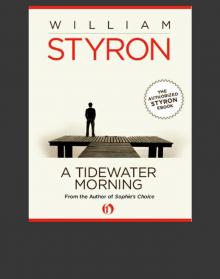 A Tidewater Morning
A Tidewater Morning Sophie's Choice
Sophie's Choice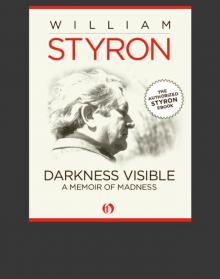 Darkness Visible: A Memoir of Madness
Darkness Visible: A Memoir of Madness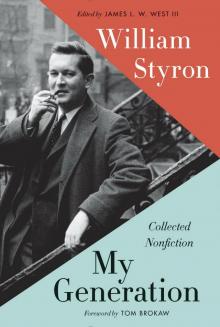 My Generation: Collected Nonfiction
My Generation: Collected Nonfiction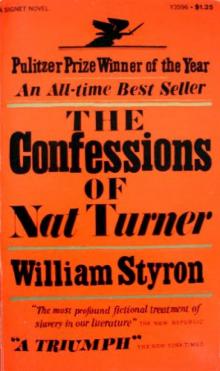 The Confessions of Nat Turner
The Confessions of Nat Turner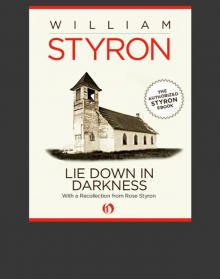 Lie Down in Darkness
Lie Down in Darkness The Suicide Run: Five Tales of the Marine Corps
The Suicide Run: Five Tales of the Marine Corps Set This House on Fire
Set This House on Fire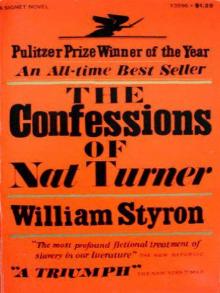 Confessions of Nat Turner
Confessions of Nat Turner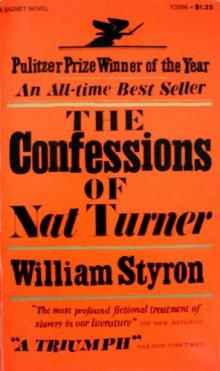 The Confessions of Nat Turner (1968 Pulitzer Prize)
The Confessions of Nat Turner (1968 Pulitzer Prize) The Suicide Run
The Suicide Run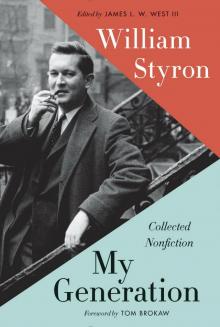 My Generation
My Generation Sophie's Choice (Open Road)
Sophie's Choice (Open Road)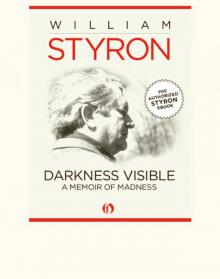 Darkness Visible
Darkness Visible